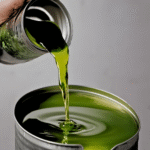⚙️ Rubber Process Oil: Properties and Applications
Rubber Process Oil (RPO) is an essential additive in the rubber industry, used to enhance the processability, softness, and performance of rubber compounds. Derived from petroleum or synthetic sources, RPO plays a critical role in improving compounding, reducing power consumption, and ensuring uniform mixing of fillers and polymers.
In this post, we’ll explore the properties, types, and key industrial applications of rubber process oil.
🧪 What is Rubber Process Oil?
Rubber Process Oil (RPO) is a lubricating agent used during the mixing and manufacturing of natural and synthetic rubber. It helps:
-
Soften the rubber compound
-
Reduce viscosity for better flow
-
Enhance filler dispersion
-
Improve the final product’s flexibility and elasticity
RPO is typically categorized by its aromatic content, which affects compatibility with different rubber types.
📊 Common Properties of Rubber Process Oil (RPO)
| Property | Description |
|---|---|
| Viscosity | Determines flow and ease of processing |
| Aromatic Content | Impacts rubber compatibility and tackiness |
| Flash Point | Indicates volatility and safety in handling |
| Color | Often dark brown to black, depending on type |
| Solubility | Affects blending with rubber polymers |
Properties of Rubber Process Oil (RPO)
Rubber Process Oil (RPO) possesses specific properties that make it suitable for rubber processing applications. Some of its key properties include:
Viscosity: RPO has a relatively high viscosity, which allows for better dispersion and mixing with rubber compounds during processing. The viscosity of RPO can vary depending on the specific grade and application requirements.
Low Volatility: RPO has low volatility, meaning it has a low tendency to evaporate at normal operating temperatures. This ensures that the oil remains in the rubber compound, providing lubrication and plasticizing effects over an extended period.
Compatibility: RPO is compatible with a wide range of elastomers, including natural rubber, synthetic rubber, and blends. This compatibility ensures that RPO can be effectively used in various rubber formulations.
Thermal Stability: RPO exhibits good thermal stability, allowing it to withstand the high temperatures encountered during rubber processing without significant degradation. This stability ensures consistent performance and prevents the formation of harmful by-products.
🧪 Types of Rubber Process Oil
🟤 1. Aromatic Rubber Process Oil
✅ High solvency power
✅ Excellent compatibility with SBR, NR, and PBR
⚠️ Contains polycyclic aromatic hydrocarbons (PAHs); limited in EU/USA
Applications:
-
Tire manufacturing
-
Conveyor belts
-
Industrial hoses
🟡 2. Paraffinic Rubber Process Oil
✅ Low aromatic content
✅ Good oxidation stability
✅ Preferred for EPDM rubber and light-colored compounds
Applications:
-
Automotive seals
-
Wire & cable insulation
-
White and colored rubber goods
🟢 3. Naphthenic Rubber Process Oil
✅ Balanced solvency and stability
✅ Moderate compatibility
✅ Good for low-temperature flexibility
Applications:
-
Footwear soles
-
Soft rubber toys
-
Industrial dampers
Applications of Rubber Process Oil (RPO)
Rubber Process Oil finds widespread application in the rubber industry, primarily in the processing of rubber compounds. Some of its common applications include:
Tire Manufacturing:
RPO is extensively used in the production of tires, both for passenger vehicles and commercial vehicles. It is added during the compounding stage to improve the processability of rubber, enhance the dispersion of fillers and additives, and provide flexibility and durability to the final tire product.
Rubber Goods Manufacturing:
RPO is also used in the manufacture of various rubber goods, such as conveyor belts, hoses, gaskets, seals, and automotive parts. It helps in achieving proper mixing and dispersion of rubber compounds, improving the flow properties, and enhancing the physical properties of the finished products.
Rubber Adhesives and Sealants:
RPO is a key ingredient in the formulation of rubber adhesives and sealants. It improves the tackiness and bonding characteristics of the adhesive, allowing for better adhesion to different surfaces.
Rubber Compounding:
RPO is widely used in the rubber compounding process, where different additives, fillers, and rubber polymers are blended together to create specific rubber formulations. It acts as a processing aid, facilitating the mixing and dispersion of ingredients, reducing viscosity, and enhancing the flow properties of the compound.
✅ Benefits of Rubber Process Oil
-
🔄 Improves Mixing Efficiency
-
🔧 Enhances Rubber Elasticity & Stretch
-
🌡️ Improves Thermal & Oxidative Stability
-
💸 Reduces Production Cost & Energy Use
-
🧴 Available in Different Viscosities & Grades
Plasticizing Effect:
RPO acts as a plasticizer in rubber compounds, improving their flexibility, elongation, and processability. It helps reduce the stiffness of rubber, making it easier to mold, extrude, and shape into the desired products.
Thermal Stability:
RPO exhibits good thermal stability, allowing it to withstand the high temperatures encountered during rubber processing without significant degradation. This ensures consistent performance and prevents the formation of harmful by-products.
Compatibility:
RPO is compatible with a wide range of elastomers, allowing for versatile usage in different rubber formulations. It provides good compatibility with natural rubber, styrene-butadiene rubber (SBR), nitrile rubber (NBR), and other synthetic rubbers.
Improved Processing:
RPO enhances the processability of rubber compounds by reducing friction and improving the dispersion of fillers and additives. This results in improved mixing, reduced compound viscosity, and efficient processing during molding or extrusion.
Cost-Effectiveness:
RPO offers a cost-effective solution for rubber processing compared to other additives. Its use can lead to improved processing efficiency, reduced scrap rates, and overall cost savings in rubber manufacturing.
📌 Frequently Asked Questions (FAQs) About
1. ❔ Why is rubber process oil used in rubber manufacturing?
⚙️ It enhances plasticity, elasticity, and processability, making it easier to mix and shape rubber during production.
2. ❔ Which rubber types are compatible with RPO?
🧪 Depending on the type, RPO works well with SBR, NR, PBR, EPDM, and NBR rubbers.
3. ❔ Is aromatic rubber oil banned?
⚠️ High-PAH aromatic oils are restricted in EU and US due to health concerns. Low-PAH alternatives are used in compliance with REACH regulations.
4. ❔ What’s the difference between paraffinic and naphthenic oils?
🟡 Paraffinic oils are more stable and suitable for high-performance applications.
🟢 Naphthenic oils provide better flexibility and cold flow behavior.
5. ❔ Can RPO affect the color of the rubber?
🎨 Yes. Aromatic oils often darken the rubber, while paraffinic oils are preferred for light-colored or white rubber goods.
🏁 Conclusion
Rubber Process Oil plays a vital role in the rubber industry by improving the processability and performance of rubber compounds.Its properties, such as viscosity, low volatility, compatibility, and thermal stability, make it an essential ingredient in tire manufacturing, rubber goods production, adhesives, and rubber compounding.
By providing plasticizing effects, enhancing processability, and ensuring compatibility with various elastomers, Rubber Process Oil contributes to the production of high-quality rubber products with improved performance and durability.
📣 Call to Pars Universal Bitumen
👉 Get the Right Rubber Process Oil for Your Industry!
We in Pars Universal Bitumen, offer high-quality RPO grades tailored for tire manufacturing, seals, hoses, and industrial parts.
📞 Contact us today to request specifications or a sample.
🛒 Browse Our RPO Grades Now → Pars Universal Bitumen-Rubber Process Oil
📧 Email: [email protected]
📞 Phone: +971 4 878 2031
🌐 Visit: https://pub-ltd.com
📞 Contact us now to request a sample or receive technical specifications tailored to your rubber formulation needs.
🛒 Order Rubber Process Oils now. Get in touch today to speak with our experts, request a technical data sheet, or receive a custom quote for Rubber Process Oil (RPO) tailored to project.
PUB-Ltd as your Oil Provider. If You have any other Query or Question you want to ask, Please don’t hesitate to Contact Us.



